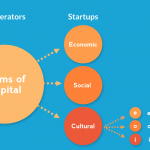
JULIA KATHERINE HAINES
University of California, Irvine[s2If is_user_logged_in()]Download PDF[/s2If]
[s2If current_user_can(access_s2member_level1)]
[/s2If]
The aim of this paper is to explore the potential for ethnographic approaches in technology startups and the venture capital firms that support and control them. The current practices and model of innovation aim for “disruptive innovation,” but most efforts fall short, prioritizing mass diffusion and not focusing on where true disruptive innovation lies—creating a change in meaning. I argue that an ethnographic approach can lead to innovation of meanings, bridging the gap between radical innovation and diffusion, and creating disruptive innovation. I discuss some ways ethnography can help product innovation in the startup sphere. But, more importantly, I discuss how ethnography holds great potential for reshaping the VC field, by driving meaning into the VC I then highlight alternative viewpoints that move beyond the “realist” perspective.
Keywords: Innovation,...



